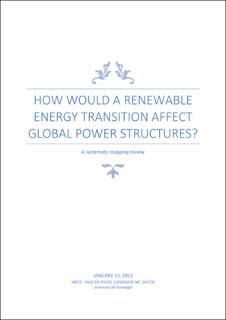| dc.description.abstract | This thesis discusses the effect a renewable energy transition would have on global power structures. This is done through a systematic mapping review focusing on quality over quantity. The field of research this subject belongs to is the geopolitics of renewables and is a novel and multidisciplinary field. Four pieces of literature were selected through the review and summarized, being The Geopolitics of Renewables in Kazakhstan & Russia (2021), The geopolitics of renewables; exploring the political implications of renewable energy systems (2016), The Geopolitics of Renewables (book) (2018), and does renewable energy redefine geopolitical risk? (2022). The literature was chosen with the purpose of creating a picture of a renewable energy future. The results show a fragmented picture, in which the markets are more competitive, the energy sector is electrified and decentralized, and a future in which rare earth materials will gain importance. Global power structures might become more decentralized as a result, becoming more communal as grids and markets become centred around regions and continents rather than across continents. | |
